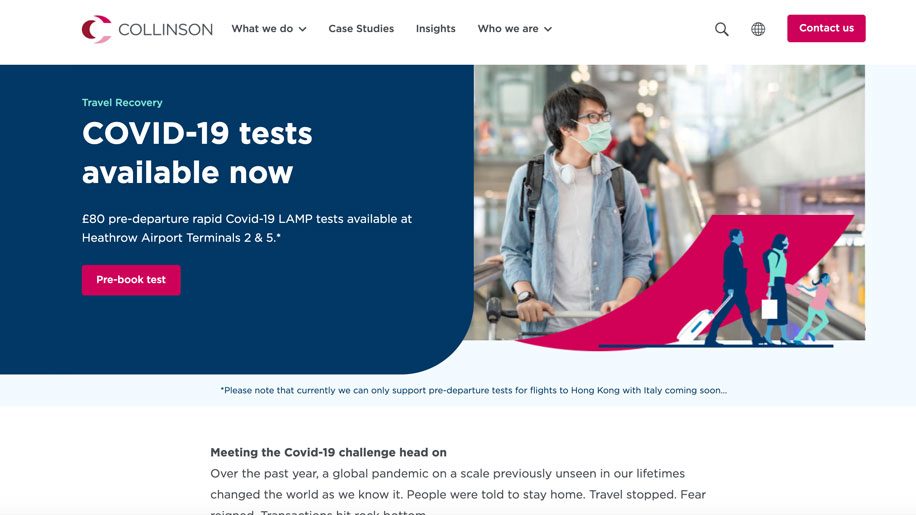
The travel industry is promoting ‘test and release’ schemes as one way out of the current impasse with regards to international travel. The schemes see passengers being tested on arrival in a country and then, after a period of self-isolation / quarantine, being tested once again. If negative, this would allow the passenger to be ‘released’ earlier than the current 14 days self-isolation period. The hope for the travel industry is that this would allow more travel than is currently possible.
The latest research is based on evidence from countries which have tried test and release and suggests that they can be operated safely and successfully.
The Public Health England (PHE) paper which the government has been relying on concluded that airport testing would identify only ‘7 per cent’ of virus cases. In contrast, single tests on arrival in Canada (Toronto-Pearson Airport), France (Paris-Charles de Gaulle Airport), Jersey and Iceland detected between 54 and 76 per cent of infected travellers.
Iceland’s testing scheme identified 69 per cent of infected travellers after one RT-PCR test upon arrival, and a further 21 per cent after a second RT-PCR test five days later – offering 90 per cent effectiveness in total following five days of quarantine, taking into account test sensitivity and detectability rates.
As a part of a trial in Canada that started on September 3, authorities at Toronto-Pearson Airport have been offering a RT-PCR test to international arrivals at Terminal 1, followed by two additional self-administered tests seven days and 14 days after arrival. Taking into account test sensitivity and detectability rates, 72 per cent of infected travellers have been detected by the on-arrival test, 18 per cent by the second test, and 0 per cent by the third test – offering 90 per cent detection effectiveness in total after seven days.
These findings are consistent with recent analysis by Edge Health and Oxera, which found that the UK government is significantly underestimating the effectiveness of air passenger testing schemes.
The research also examined Jersey’s Safer Travel Testing Programme from July and August. The programme required international arrivals from ‘green’ lower-risk countries to take one RT-PCR test on arrival and isolate until a negative result was received, usually on the following day. Individuals also had the option to provide an RT-PCR test conducted within the 72 hours prior to their arrival in Jersey. Oxera and Edge Health estimate the effectiveness of Jersey’s on-arrival testing to be up to 63 per cent.
Oxera and Edge Health also considered a scheme by the French authorities to test arrivals at Paris-Charles de Gaulle Airport from French Overseas Territories (La Réunion, Guadeloupe, Martinique, St Bart and St Martin) during June and July. Their analysis of the data indicated that 76 per cent of infected travellers were detected by an on-arrival test, and an additional 14 per cent were detected after a seven-day quarantine.
Michele Granatstein, Partner at Oxera and Head of its Aviation practice, said:
‘These results, based on real-world testing schemes, are significantly higher than the 7 per cent estimated by PHE. The analysis provides further evidence that the UK government is significantly understating the effectiveness of testing on arrival schemes.’
George Batchelor, Cofounder and Director of Edge Health, said:
‘The evidence from other countries suggests how beneficial a testing regime is when compared to a blanket 14-day quarantine policy, like we have in the UK. The combination of testing with a short quarantine period would also be effective, in advance of a common international standard on testing, with data from Iceland providing clear evidence that there is little to be gained by introducing a seven-day period, over a five-day one.’
To date, over 30 countries, including Portugal, Cyprus, Italy and Germany, have introduced a form of passenger testing. France and Portugal require no quarantine on arrival if individuals can show a negative test result from a period of 72 hours before boarding the plane. In other cases, travellers from high-risk countries are required to take a test a certain number of days after arrival (e.g. five days in Belgium) and can then be released from quarantine subject to a negative test result.
The new analysis has been submitted to the UK Global Travel Taskforce, which is expected to report its recommendations to the Prime Minister in early November despite the new national restrictions announced over the weekend, including a ban on outbound travel until 2 December. Later this month, Oxera and Edge Health will publish final updated modelling on passenger testing effectiveness, using the latest data aligned to real-world evidence.












